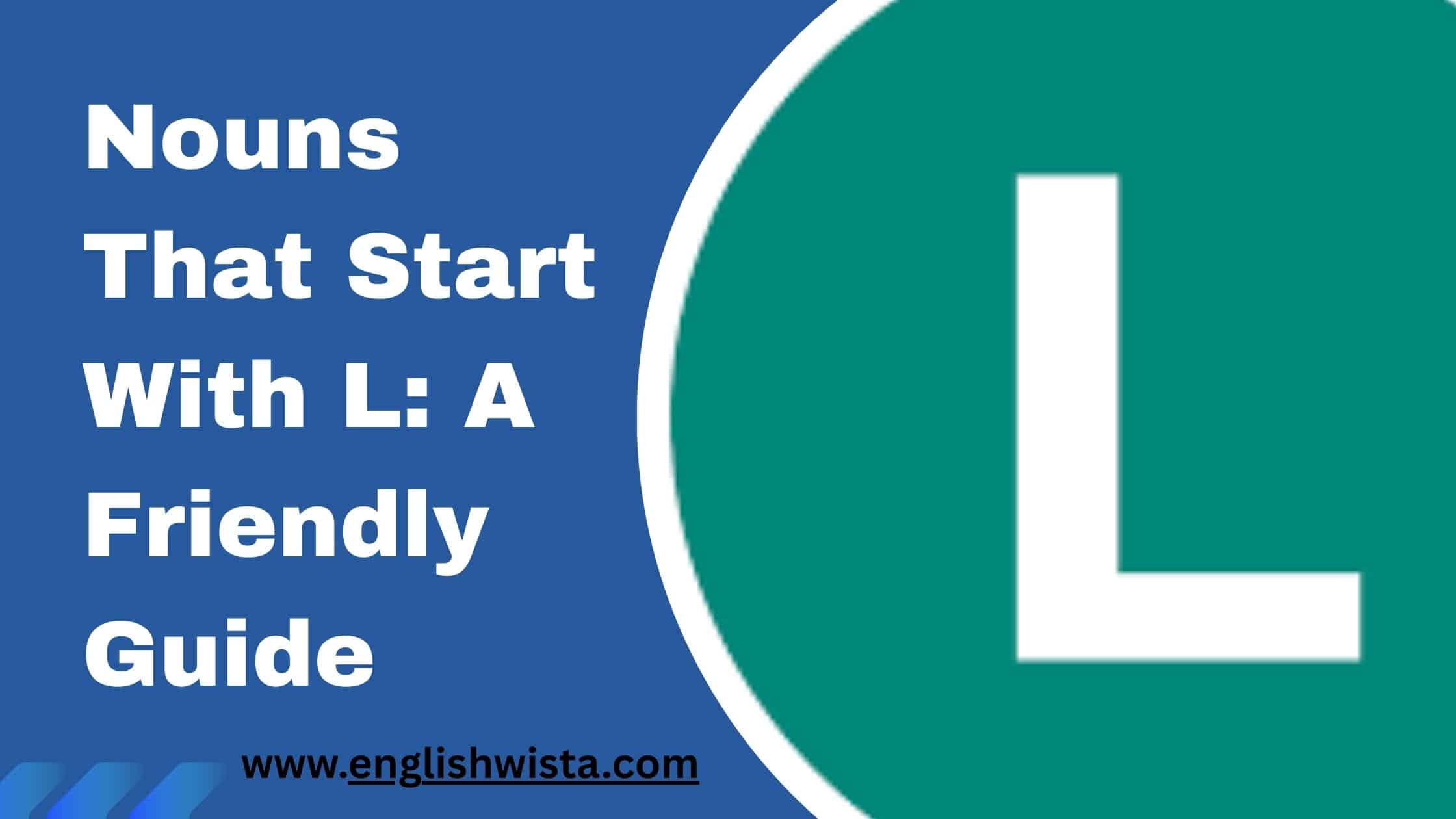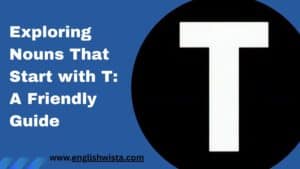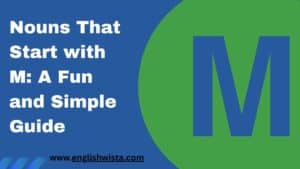Have you ever noticed how many words in English begin with the letter L? It’s a lovely letter (see what I did there?), and it starts so many nouns that we use in our everyday conversations. From lion to lamp to love, nouns with L pop up all around us.
This article is here to make learning about nouns that start with L simple, clear, and maybe even a little fun. Don’t worry no heavy grammar lessons or confusing explanations. Just plain, friendly talk about nouns, lots of examples, and some interesting facts to help everything stick.
So, grab a cup of tea or coffee, and let’s dive into the world of L nouns together.
What Is a Noun?
Before we explore nouns starting with L, let’s quickly refresh what a noun is.
A noun is simply a naming word. It gives a name to a person, place, thing, or idea. For example:
- A person: Laura, lawyer, lady
- A place: London, library, lake
- A thing: ladder, lamp, lemon
- An idea: liberty, love, laughter
That’s it nouns are just names. Easy, right?
Why Focus on L Nouns?
You might be wondering: why only nouns that begin with L? Well, here are a few reasons:
- L is common. Many everyday nouns begin with this letter.
- It’s easy to pronounce. The soft “llll” sound rolls off the tongue.
- It’s fun to learn. Exploring words with the same starting letter helps your brain remember them better.
So, by learning L nouns, you’re not only improving your vocabulary you’re also building a neat mental list of words that stick together.
Common Nouns That Start With L
Let’s start with some of the most common and useful nouns beginning with L.
- Lamp – The object that gives you light.
- Lion – The big, strong animal often called “the king of the jungle.”
- Lake – A large body of water surrounded by land.
- Letter – A character in the alphabet OR a written message you send.
- Library – A place filled with books.
- Love – A powerful feeling of affection.
- Ladder – A tool you use to climb up or down.
- Lunch – The meal you eat in the middle of the day.
Example sentences:
- I turned on the lamp because the room was dark.
- The lion roared loudly in the zoo.
- We had a picnic near the lake.
- She wrote me a long letter yesterday.
- The library is my favorite place to read.
- They are deeply in love.
- He used a ladder to paint the wall.
- What are you having for lunch today?
Is “Love” Really a Noun?
This is a question many learners ask. Isn’t love a verb too? Yes! You can say “I love ice cream” (verb). But love is also a noun when it means the feeling itself.
For example:
- “Their love is strong.” → Here, love is a thing (the feeling).
So yes, love is both a noun and a verb. English is flexible like that!
Singular and Plural L Nouns
Nouns can be singular (one) or plural (more than one). Let’s look at some L nouns in both forms:
- Singular: leaf | Plural: leaves
- Singular: lady | Plural: ladies
- Singular: lamp | Plural: lamps
- Singular: lion | Plural: lions
- Singular: lake | Plural: lakes
Example sentences:
- One leaf fell from the tree.
- The autumn wind blew away many leaves.
- She is a kind lady.
- Several ladies helped at the event.
- I bought a new lamp.
- The store sells colorful lamps.
Notice how some nouns (like leaf → leaves) change spelling when they become plural. That’s just one of those little English quirks.
L Nouns for People
Some L nouns are used to describe people:
- Lawyer – A person who practices law.
- Leader – Someone who guides others.
- Lady – A polite word for a woman.
- Librarian – A person who works in a library.
- Lifeguard – Someone who protects swimmers.
Example sentences:
- The lawyer explained the case clearly.
- Our class leader gave a great speech.
- She is a generous lady.
- The librarian helped me find the book.
- The lifeguard jumped into the pool to save a child.
L Nouns for Places
Here are some L nouns that describe locations:
- London – The capital city of the United Kingdom.
- Library – A place to read and borrow books.
- Lake – A body of water.
- Laboratory – A place where experiments are done.
- Lighthouse – A tall tower with a light to guide ships.
Example sentences:
- London is full of history.
- The library closes at 8 p.m.
- We swam in the lake last summer.
- Scientists worked in the laboratory.
- The lighthouse shone brightly at night.
L Nouns for Things
Many objects we use daily start with L:
- Laptop – A portable computer.
- Luggage – Bags you carry while traveling.
- Lock – A device to secure doors.
- Locket – A small piece of jewelry that opens.
- Lawnmower – A machine for cutting grass.
Example sentences:
- I bought a new laptop for work.
- She packed her luggage for the trip.
- Don’t forget to close the lock on the gate.
- The locket held a tiny picture.
- He used the lawnmower to cut the garden grass.
Abstract L Nouns (Ideas and Feelings)
Not all nouns are things you can touch. Some describe ideas or emotions.
- Liberty – Freedom.
- Loyalty – Being faithful.
- Luck – A force that brings good or bad results.
- Logic – Clear reasoning.
- Laughter – The sound of joy.
Example sentences:
- People fought for their liberty.
- Her loyalty to her friends is admirable.
- He had good luck in the game.
- The teacher used logic to explain the problem.
- The children’s laughter filled the room.
Fun Facts About L Nouns
Here are some little extras to keep things interesting:
- The word lemon comes from Arabic origins (laymūn).
- A group of lions is called a pride.
- The noun library comes from the Latin word liber, meaning “book.”
- The word ladder is one of the oldest words in English, dating back to Old English times.
- Luck is related to an old Middle Dutch word luc, which meant “happiness” or “good fortune.”
Tips for Remembering L Nouns
Here’s how you can make these nouns stick in your memory:
- Make word lists. Write down 10 new L nouns every week.
- Use them in sentences. The more you use them, the better you remember.
- Group them by type. For example, group people (lawyer, leader, lady), places (library, lake, London), and things (lamp, laptop, ladder).
- Play games. Try word games like “Name an L noun in 5 seconds!” with friends.
Conclusion
Nouns starting with L are everywhere in our homes, in our conversations, and in our thoughts. From concrete objects like lamps and ladders to abstract ideas like love and liberty, they give names to so many important parts of life.
Now you know how to spot them, use them, and even play around with them in sentences. Keep practicing, and soon these words will feel as natural as your favorite snack at lunch.
So next time you hear the soft “llll” sound at the start of a word, pause for a moment. You might just have discovered another friendly L noun to add to your collection!



